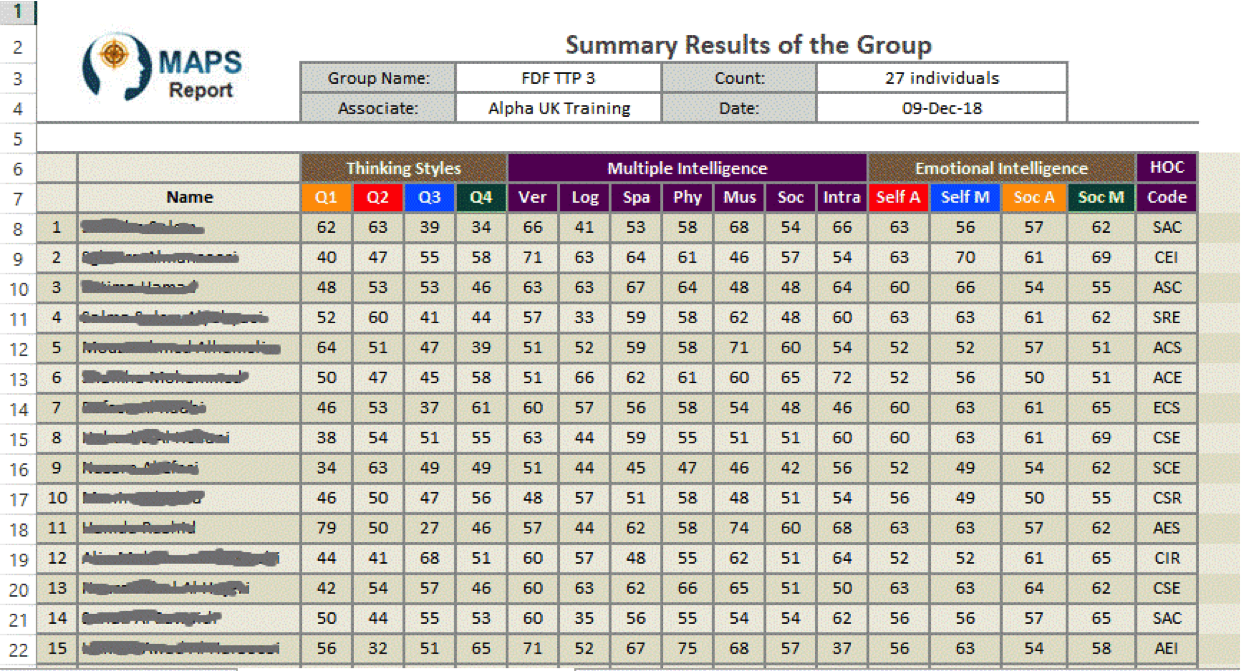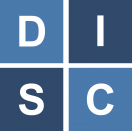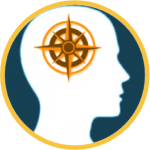
Multiple Assessment Profile System (MAPS)
A powerful tool to help individuals, educators, consultants, and managers improve their performance
MAPS is a comprehensive multi purpose assessment system. It is designed and developed with the input of extensive research over many years. It’s easy to use, powerful and can help you understand yourself and others.
MAPS integrates four assessment instruments and tools, to help individuals, educators, consultants, and managers improve their performance.
Multi-dimensional Analysis in One Single Assessment
The core principle of MAPS is that individuals are a complex combination of personality, thinking styles, attitude and emotion. In order to improve self and other’s performance, people need to be able to understand themselves and see guidelines and indicators of their baseline abilities and any improvement from it.
MAPS is not a personality or psychometric test. It is an instrument designed to explore aspects of behaviour, thinking style, learning preference, academic & career direction and motivation.
MAPS Indicators
MAPS integrates several assessments in one tool, including:
Thinking Styles
A thinking style is how you process information most efficiently (and naturally). The way we communicate with one another and interpret the communication depends on the way our brains translate the given task
Multiple Intelligence
Multiple Intelligences (MI) asserts that all people possess several types of intelligence: Multiple Intelligences are ways that individuals learn best. It also helps teachers differentiate instruction activities in a classroom work session.
Emotional Intelligence
Emotional intelligence (EI) is the ability to identify, assess, control and manage the emotions of oneself and of others.
Holland Occupational Code
Holland Code personality types, helps you learn what kind of work environments suit you best. Choose a career that matches your preferences and you will increase your chances of being successful!.
Features of MAPS
- MAPS is not a test : there are no right or wrong answers.
- It is an Integrated assessment solution that enable you to have a set of “Indicators” of four attributes.
- Based on most prominent theories and research to give you a thorough set of highly valuable tools in one instrument.
- Easy-to-use and engaging formats that minimises administration cost and time-to-complete
- Computer scoring and interpretation provide efficient and extensive reports
- There are no right or wrong answers.
- It does not label individuals by telling them what they ‘are’,
- It is an assessment tool that enable you to have a set of “Indicators” of four attributes.
- It demonstrates why people may tend to behave in certain ways in given situations
- MAPS take about 15 minutes to complete.

Strengthen your career well-being with a career or major that fits your personality
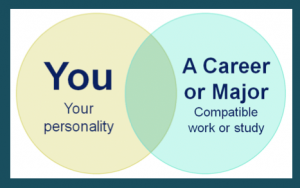
MAPS Applications
In order to improve self and other’s performance, people need to be able to understand themselves and see guidelines and indicators of their personal attributes.
Assessments tools are designed to help individuals understand how a variety of personal attributes impact their potential success and satisfaction in their life and work environments
MAPS is a multi-dimensional assessment that evaluates thinking, learning, intelligence, behaviour and emotion.
Leadership Development
Developing the leadership abilities and attitudes of individuals to enhances the quality of leadership
Training and Development
Using planned and unplanned learning, in order to achieve and maintain a competitive advantage for the organization
Career development
Helping to gain more knowledge, skills, attitudes and behaviours that help people
Team Building
Develop group members and their ability to work together effectively. organize and coordinate them towards a common goal
Family and relationship
Develop a successful, stable and strong family relationship takes a lot of time and hard work. Learn skills that create closer ties and stronger families
Recruitment and selection
Make sure that job holders have the right personality, thinking style, values and attitudes to help the organisation achieves its objectives.
Academic direction
Help students in the decision-making about their learning and improve their confidence and academic performance by creating a map of learning.
Thinking and Intelligence Assessment System for:
- Leadership Development
- Training and Development
- Career development
- Team Building
- Family and relationship
- Recruitment and selection
- Academic direction
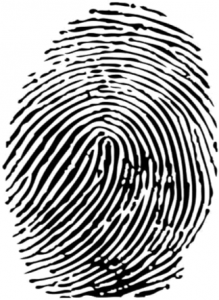
Our personalities are very much like our fingerprints, no two are alike. Every personality is unique and has varied characteristics
Match and Mismatch between Personality and Occupation
Mismatch between Personality from one side and Education & Occupation from another side results in two risks:
- Falsification of Type (Individual health)
- Disengagement (Productivity)
Falsification of Type
Dr. Benziger’s found, in her book Falsification of Type, that falsification of type is a tremendous global problem affecting production, individual and corporate effectiveness, health and mental health so dramatically that it can be understood to be as serious as AIDS.
Source: Benziger, Katherine, PhD. Thriving in Mind: The Art and Science of Using Your Whole Brain. P Introduction. IL:KBA, 2009.
People are happiest, healthiest (mentally, emotionally, physically and spiritually) and most successful when they are functioning from, and being rewarded for using, their innate skills and abilities
Jung described Falsification of Type as “a violation of the natural disposition,”
The Costs of Falsification of Type
“When people adapt their natural thinking and working styles to fit expectations of others, normally created by work and career, tension and stress results.
People are not happy and effective if they behave in unnatural ways.”
This is the Cost of Falsifying of Type
Falsification of Type and the Brain
Mismatch between Personality from one side and Education & Occupation from another side results in two risks:
- Falsification of Type (Individual health)
- Disengagement (Productivity)
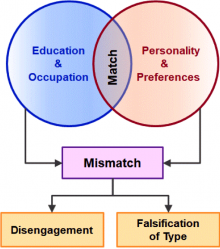

Falsification of Type is a violation of the natural disposition
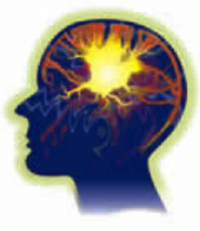
Cost of Falsifying of Type Falsification of Type pushes the brain to “burn hotter”

Estimates by Dr. Richard Haier of San Diego indicate the brain might need to work as much as 100 times harder when developing or using skills outside a person’s area of preference because that preference is naturally so much more efficient than any other mode
MAPS helps dealing with Falsification of Type and Disengagement in terms of Diagnosis and Prevention
Important
There are no good or bad types, personalities, intelligence, thinking style or jobs – all have some natural strengths and some possible pitfalls or blind spots.

MAPS Four Indicators
Thinking Styles
Understand yourself and others. The more you understand somebody, the better you can adapt your style.
A huge amount of misunderstanding and miscommunication developed from the fact that individuals who used one style of thinking typically assumed that all other people used their own thinking style.
MAPS Thinking Styles assessment helps you learn the thinking styles you use most often in life to make decisions, solve problems, and innovate. Learning about your thinking style will help you enhance your communication, decision making, interaction with others, creativity, as well as self and other awareness.
MAPS thinking styles model is based on the four quadrant metaphoric model of the brain modes of thinking.
These four quadrants (Q1, Q2, Q3, Q4) illustrate the thinking preferences of individuals. Each of the four quadrants of the brain has its own talents and abilities.
MAPS evaluates and depicts the degree of preference individuals have for thinking in each of the four brain quadrants:
- Q1 – Yellow: Visual, Holistic, Innovative, Hunches, Speculative, Fantasy, Imaginative, the Future
- Q2 – Red: Emotional, Interpersonal, Sensory, Kinesthetic, Symbolic, Subjective, Personal, Values Intimacy, Humane, Harmony
- Q3 – Blue: Sequential, Organized, Planned, Detailed, Structured, Realistic, Down-to-earth, Practical, Sensible, The Past
- Q4 – Green: Logical, Analytical, Quantitative, Factual, Critical Analytical, Objective, Principles, Standards, Criteria, Critiques
Thinking preferences have an impact on virtually everything we do

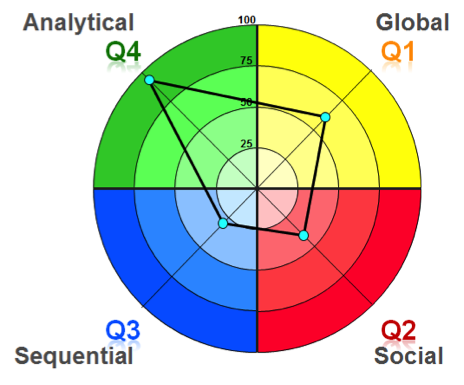
Group Profiles
MAPS can also generate a Team or a Group Profile showing the position of each person within the team as a small circle. The Chart shows an example of the profiles of 11 people in the group.
People who are diagonally opposite each other often have real issues understanding each other or valuing each other. However, when they understand MAPS they realise that together they can be far more successful. What was previously a problem becomes a benefit.
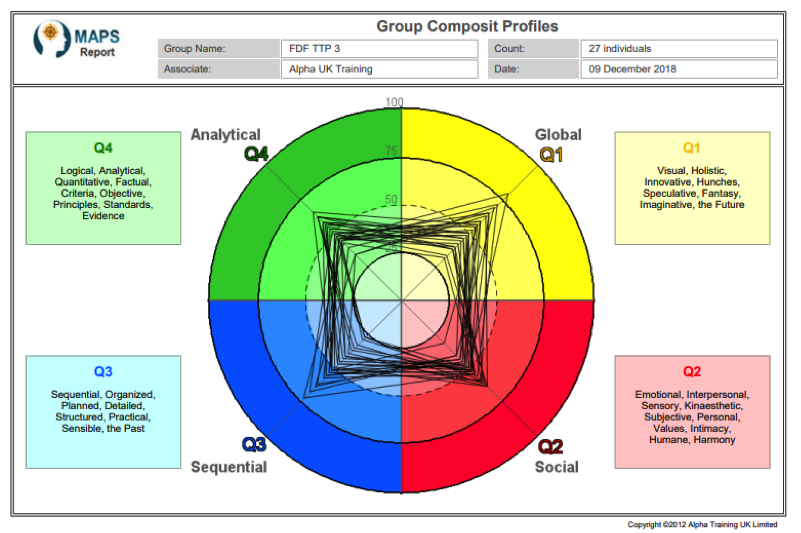
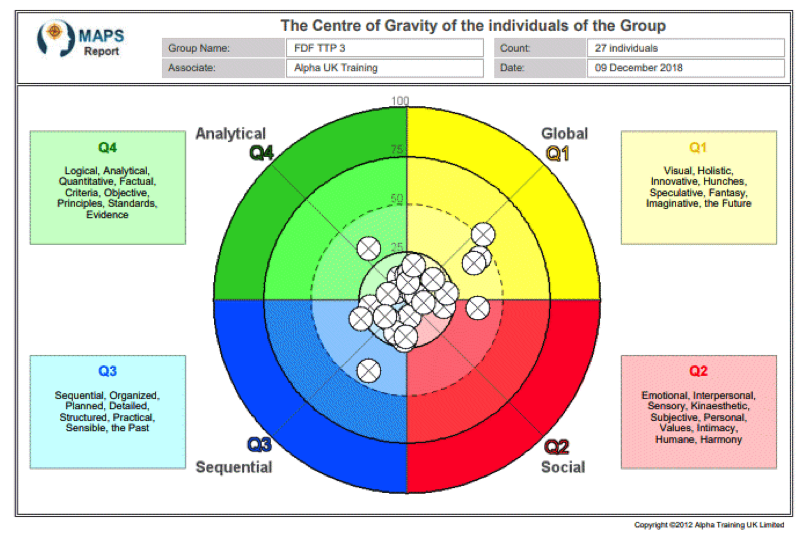
Emotional Intelligence
Emotional intelligence (EI) is the ability to identify, assess, and control the emotions of oneself, of others, and of groups.
Emotional intelligence is the ability to identify, assess, understand, and manage your emotions and others in positive and constructive ways. It’s about recognizing your own emotional state and the emotional states of others.
- Self-awareness – The ability to recognize your own emotions and how they affect your thoughts and behavior, know your strengths and weaknesses, and have self-confidence.
- Self-management – The ability to control impulsive feelings and behaviors, manage your emotions in healthy ways, take initiative, follow through on commitments, and adapt to changing circumstances.
- Social awareness – The ability to understand the emotions, needs, and concerns of other people, pick up on emotional cues, feel comfortable socially, and recognize the power dynamics in a group or organization.
- Relationship management – The ability to develop and maintain good relationships, communicate clearly, inspire and influence others, work well in a team, and manage conflict.
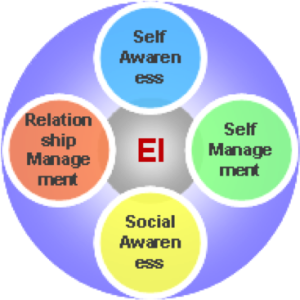
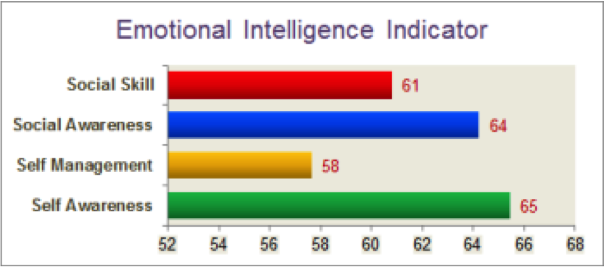
Multiple Intelligence
Gardner first outlined his theory in his 1983 book Frames of Mind: The Theory of Multiple Intelligences, where he suggested that all people have different kinds of “intelligences.” Gardner proposed that there are eight intelligences, and has suggested the possible addition of a ninth known as “existentialist intelligence
Studies show that many students who perform poorly on traditional tests are turned on to learning when classroom experiences incorporate artistic, athletic, and musical activities.
According to Gardner, there are eight kinds of intelligences. Howard Gardner’s theory of multiple intelligences requires teachers to adjust their instructional strategies in order to meet students’ individual needs.
The Theory of Multiple Intelligences (MI) encourages instructors to break from the traditional methods of presenting materials in a manner suited to only logical-mathematical and linguistic learners and to instead present materials using methods that will reach all learners.
MI can help students and teachers develop a deeper understanding of their abilities. It demonstrates to students how they can use their strengths and address their weaknesses. It boosts self-esteem and encourages risk-taking. It motivates students to learn more and to learn deeply.

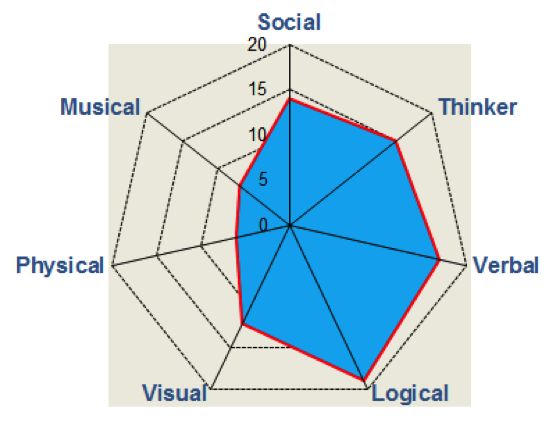
Holland Occupational Code
The Holland Codes or the Holland Occupational Code (HOC) represents a set of personality types described in a theory of careers and vocational choice formulated by the late psychologist John L. Holland.
Dr. Holland (1985) created Holland Code Career Model, Holland Hexagon Model or Holland Codes.
Each of the six types (Realistic, Investigative, Artistic, Social, Enterprising, Conventional) or RIASEC reflect Holland’s theory that “the choice of a vocation is an expression of personality.”
The Occupational Codes are:
- Realistic
- Investigative
- Artistic
- Social
- Enterprising and
- Conventional
The more a person is able to express their personality within a compatible work environment, the higher the likelihood of finding career satisfaction.
MAPS helps to determine professional satisfaction by Identifying the Holland Code of your current job and the job you are interested in.
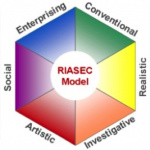

Holland Code is a combination of two or three of these personality types to specify job choices
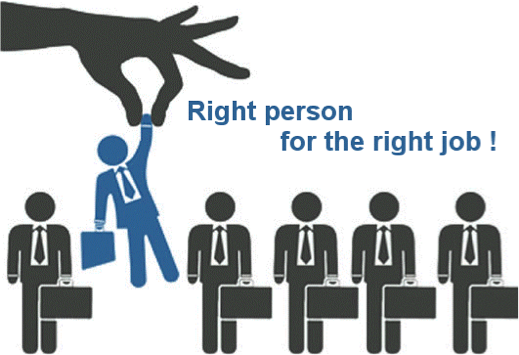
Group Summary Results
Information is often easier to understand when it is presented in groups. For example. MAPS can generate group summary results covering all indicators as shown in the sample below.
The group results can also be exported to Excel for further analysis.
